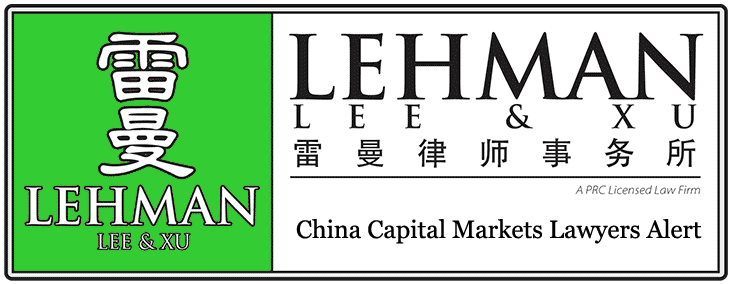
 |
|
LEHMAN, LEE & XU China Lawyers
|
|
China Capital Markets law In The News
|
|
May 2013
|
The China Law News keeps you on top of business, economic and political events in the China. |
|
|
|
In the News |
Higher Debt at China Oil Giants Could Slow M&A Activity |
With tough economic times affecting the whole world’s business practices, many companies are looking to international bond markets to lower their debt levels and to make themselves more financially viable. Even in a “prosperous” China, big companies are seeking out capital via bond markets. Consider the following. China’s three state-owned oil giants have raised billions of dollars from global bond markets in recent weeks, bringing their debt levels to multiyear highs. While they will continue to buy assets overseas, their ability to buy big will be limited, analysts say. China National Petroleum Corp., which is PetroChina Co.’s parent Cnooc Ltd. 0883.HK +1.39% and China Petroleum & Chemical Corp. 600028.SH -0.58%, or Sinopec, have sold a total of $9.5 billion in bonds in the past month, 25% more than the $7.6 billion they raised in all of 2012. With the fundraising has come higher debt-to-equity ratios, which will likely soar to an average of almost 50% for the three companies this year, Bernstein Research senior analyst Neil Beveridge said, from around 20% in 2007. That is also well above the average of 20%-30% at international oil companies. The three Hong Kong-listed companies spent $34 billion on acquisitions in the past year, Dealogic said, putting their combined free cash flow, or operating cash flow minus capital expenditure, in negative territory last year. Free cash flow of these oil firms should “stay in negative territory in the next three years due to flat commodity prices and continuous growing capex,” Beveridge said “Going forward, this [increase in debt] can slow down their pace of mergers and acquisitions. You know, five years ago, this is not something you needed to worry about. I think the ability of Chinese oil companies to do mega acquisitions is definitely lower,” he said. Cnooc is no stranger to record-breaking deals, completing in February a $15.1 billion purchase of Canadian oil company Nexen Inc., China’s biggest overseas acquisition. In March, Sinopec agreed to buy $1.5 billion in oil and gas assets held by its state-owned parent in countries including Kazakhstan, Colombia and Russia. The increase in debt comes as the companies seek to boost their oil and gas reserves and build energy infrastructure in China. Their capital expenditure will likely rise 12% to 632 billion yuan ($102.7 billion) this year, analysts say. Also, Cnooc and Sinopec need to repay loans they took out to buy assets. Cnooc said it will continue to track its debt-to-equity ratio to make it comparable with its peers, and will maintain healthy and stable financials. To be sure, there are plenty of takers for the bonds. The $4 billion bond issued by Cnooc last week was five times oversubscribed, thanks to robust demand from large U.S. institutional funds, attracted to big offerings from state-owned firms that are a play on the Chinese economy. The bonds’ yields are also more attractive than those of U.S. Treasurys. Cnooc’s 10-year, $2 billion tranche was sold at 3.179% yield, while 10-year Treasurys were yielding 1.740% on Friday. “Starting from last year, Chinese corporate bonds, which were mostly sold to emerging-market bond funds in the past, have become much more appealing to U.S.-based bond investors,” said Fang Fang, vice chairman of Asia investment banking and chief executive of China investment banking at J.P. Morgan Chase JPM +1.28% & Co., which has arranged bond sales for CNPC, Sinopec and Cnooc. The bond sale by Cnooc was the biggest ever by a Chinese company, and attracted $23.8 billion worth of orders just 16 hours after it was announced, people with direct knowledge of the matter said earlier. “The Cnooc deal attracted lots of demand from investors globally because Cnooc is a well-known global oil and gas company with very good credit quality and ratings,” said William Fung, marketer of debt capital markets Asia at UBS UBSN.VX +0.78%. The bond offering, issued by subsidiary Cnooc Finance (2013) Ltd., carries provisional ratings of Aa3 by Moody’s Investors Service and double-A-minus by Standard & Poor’s. “We will continue to see more Chinese firms raising funds from the international bond markets as the Chinese economy continues to grow,” Fung said. http://blogs.wsj.com/moneybeat/2013/05/06/higher-debt-at-china-oil-giants-could-slow-ma-activity/
|
|
|
|
|